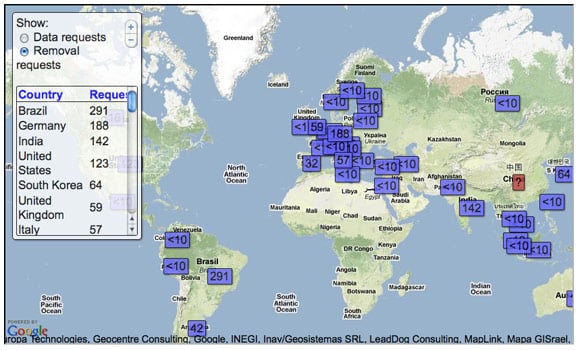Google Makes Government Censorship Requests Public Knowledge
Net neutrality. Censorship. Freedom of speech. Global search. All of
these items are becoming more and more visible in an interconnected
world, and we suspect that these issues will become even more important
as the Internet spreads. Recently, Google brought some of these matters
into the mainstream light by taking on China in a way that no search
engine ever had: Google refuses to continue censoring results, and
redirected searches to their Hong Kong portal in order to achieve their
goal while maintaining within China.
This week, Google has opened another can of worms. The new Government Requests Tool is quite the eye-opener, giving mere citizens the ability to see how many times a given government has requested information and how often they have asked the company to remove content from their sites or search index for reasons outside of copyright violations. The tool shows that America had just over 3500 total requests for information during the July-to-December 2009 period, which includes subpoenas and search warrants from state, local and federal law enforcement officials. Brazil topped even the U.S. in total number of requests.

Google is hoping that this will make governments think twice before asking for censorship. If citizens openly know just how hard their government is trying to have the Web censored, there's more chance that revolts will break out and anti-censorship parties will have grounds for dispute. The company simply feels that "greater transparency will lead to less censorship." We couldn't agree more. If citizens know exactly what their governments are doing behind their backs, maybe they'll stop doing it. One can hope so, anyway.
This week, Google has opened another can of worms. The new Government Requests Tool is quite the eye-opener, giving mere citizens the ability to see how many times a given government has requested information and how often they have asked the company to remove content from their sites or search index for reasons outside of copyright violations. The tool shows that America had just over 3500 total requests for information during the July-to-December 2009 period, which includes subpoenas and search warrants from state, local and federal law enforcement officials. Brazil topped even the U.S. in total number of requests.

Google is hoping that this will make governments think twice before asking for censorship. If citizens openly know just how hard their government is trying to have the Web censored, there's more chance that revolts will break out and anti-censorship parties will have grounds for dispute. The company simply feels that "greater transparency will lead to less censorship." We couldn't agree more. If citizens know exactly what their governments are doing behind their backs, maybe they'll stop doing it. One can hope so, anyway.

